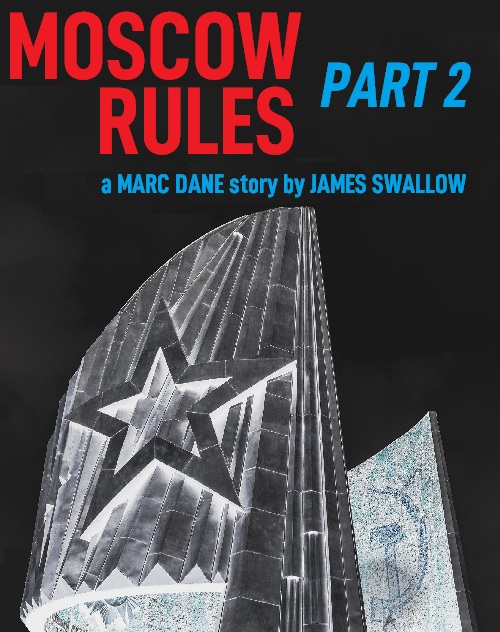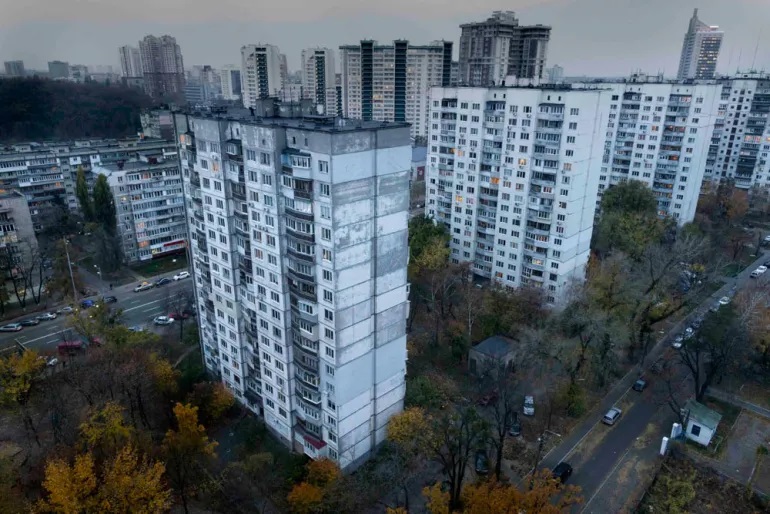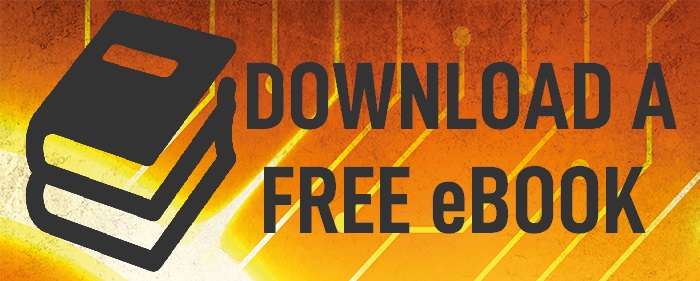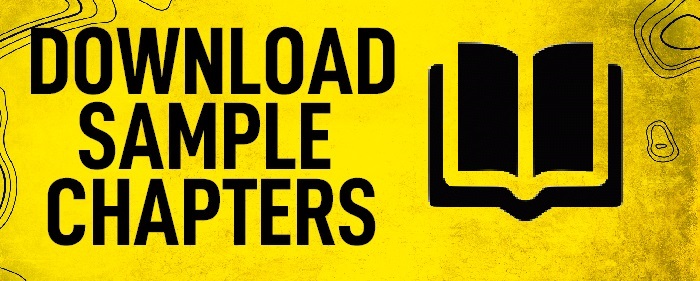Today’s blog features the second part of MOSCOW RULES, a brand-new Marc Dane story…

On a mission to fulfil a request for his employer on the streets of Moscow, Marc Dane finds himself dragged into a deadly scavenger hunt for a prize that could cause chaos in the wrong hands…
In Part 1, Marc attended the funeral of notorious KGB spymaster Sergei Morozov – but what seemed like a simple matter of laying some flowers on a grave took a mysterious turn when the dead man’s widow slipped him a key and a secret message…
Read on for Part 2 of MOSCOW RULES; future chapters will be released via this blog, but if you’d like to get early access, sign up to the James Swallow Reader’s Club at this link or type your email address in the box at the bottom of this page.
MOSCOW RULES Part 2: NEVER GO AGAINST YOUR GUT
The journey took a couple of hours, as Marc criss-crossed the city in taxis, moving northwest, deliberately advancing in a semi-random pattern. He described a stair-step path over the Moscow streets, making Timiryazevskiy Park his apparent objective to throw off any followers. It was a simple matter to lose himself among the tightly-packed stands of birches bordering the park’s footpaths, doubling back to hail one last ride to take him where he actually wanted to go.
Content that he had thoroughly ‘washed’ his route, Marc headed to the address hidden in the key fob. He paid the cab driver a healthy tip and exited into Golovinsky District; it was largely residential, avenues lined with skeletal trees screening lines of five-storey apartments, and brutalist tower blocks rising into the snowy sky.

It was strange how much it reminded Marc of where he grew up. Change the signs in Cyrillic to English, swap the worn-out Lada kopeikas for worn-out Ford Escorts, and it could have been the South London council estate where he’d spent his teens. It made him feel homesick and relieved all at once. When Marc escaped the estate to join the Navy, getting free of the drag that would have pulled him into a life of petty crime, he’d never looked back. The military life had led him into MI6 and all that had followed, but there would always be a bit of him that lived in a place like this, no matter how far away he got.
He circled the building he was looking for, scoping out entrances, searching for anything that might be surveillance – but Marc saw nothing, just shabby rows of lock-up garages and narrow open courtyards heavy with layers of dirty snow. He followed a middle-aged woman walking a dog, letting her buzz herself back in through the security door, and briskly pushed past before she could get a good look at him.
The mortice key on the fob Galina Morozova gave him fitted the lock of an apartment on the top floor. The elegant pensioner had completed the brush pass with the skill of a consummate professional, and Marc wondered how much of her husband’s clandestine life she’d been party to, over the years. It was an old school move, but then Morozova’s spouse was the epitome of the archetypical Cold War spook – and in an age where technology infiltrated every aspect of the clandestine world, going back to crude, analogue-era tradecraft was a smart play.
The door showed no signs of forced entry, and Marc turned the key, easing it open. He wondered what awaited him – some safehouse the old Russian kept hidden in case his enemies ever remembered him? – but then he saw the mess in the narrow entrance hall.
Marc took a step back from the threshold and pushed the door all the way open with one gloved hand. He saw waist-high bookshelves stripped of their contents and little piles of yellowing old paperbacks left where they’d been dropped, torn down pictures in broken frames and even the plastic facias of plug sockets hanging half-out of the walls. A naked light fitting in the ceiling had suffered a similar fate, and the damage looked recent, and methodical.
His other hand drifted unconsciously to the small of his back. Under different circumstances, he would have been carrying a Glock semi-automatic pistol there in a paddle holster. But Marc had no weapon to defend himself today, if whomever had done this was still lurking inside.
Turn around and walk away. The voice in his head was unequivocal. Too many variables here. Too many unknowns. He should have been back at his hotel, preparing to exfiltrate. With the flowers laid and the respects paid at Sergei Morozov’s funeral, Marc had completed the task he’d been given.
Or have I?
Instinct warred with curiosity. The spymaster’s widow wouldn’t have sent him here without good cause, but was it in Marc’s interest or was it to serve someone else’s agenda?
Despite his misgivings, curiosity got the upper hand. At length, he took a step over the threshold, and carefully closed the door behind him. Inside, the apartment smelled like old bachelor – the whiff of stale beer and cooked food, a bit of wet dog and second-hand bookshop smell in the mix. He could hear the low burble of a television in a neighbouring apartment, but otherwise it was quiet. The radiators were stone cold, and the hot tap in the cramped kitchenette delivered only spurts of freezing water. Marc picked his way from room to room – hall to kitchen, kitchen to lounge, lounge to bedroom, bedroom to bathroom – avoiding every heap of debris where they lay. Nothing had been overlooked, from the contents of the cutlery drawers to the clothes in the careworn wardrobe. He pulled at a mound of rumpled shirts on the bed, finding nothing but cheap and serviceable labels.
Not the kind of thing I’d expect a man like Morozov to wear, he thought. But then, maybe that was the point. The old spy had been granted a nicely-appointed dacha from a grateful nation, in which to spend his twilight years, not a pokey little one-bedroom flat like this. Maybe this place is so unremarkable because he wanted somewhere off the grid. And given the state of disarray, it was clear that someone else had turned it over in search of something that had value. Again, Marc thought about the armed men filming Morozov’s funeral. Was this mess their handiwork?
He went back to the lounge, returning an upturned chair to its correct position, and sat. There was no television, the only modern elements visible a Chinese-made DAB radio and a wireless landline telephone. Books appeared to have been the only form of entertainment available, all of them scattered over the threadbare carpet. Marc’s gaze drifted to the empty shelves. Part of the lacquered wood backing was splintered along a join, as if a failed attempt had been made to prise it apart.
He moved closer, running his gloved fingers over the damage. There was a false panel there, metal covered with a layer of stained wood. On the floor, a bent steak knife from the kitchen lay discarded.
Marc played out the situation in his head. Somebody gets in here, trashes the place looking for…whatever…but they don’t reckon on finding a hidden safe. Don’t have the kit to open it.
On the one hand, that could look like the work of opportunist thieves. On the other, it might be cover for something else.
One thing was certain. Marc threw a look toward the hallway. They’ll be back, he thought. I should go.
But then his fingertip traced over a void in the panel. A hole cut in the wood, just big enough to fit a tiny key – like the kind you’d use to open a pair of handcuffs or a jewellery box.
The second key on the fob fitted perfectly, and turned with a well-oiled click. The splintered panel popped open, revealing a steel-lined fireproof inner behind it.
He wasn’t sure what to expect inside – spools of microfilm or faded old files stolen from KGB headquarters? – but certainly not a sealed bottle of Krystall vodka. With a half-smile, Marc picked it up, examining the perfect clarity of the liquor within. The bottle sported a high-grade special label, meaning it was from batches made expressly for ranking members of the politburo. A cardboard gift tag hung around its neck.
The tag had a message, in the same patient handwriting as the address in the key fob. Solomon, my old friend, it read, drink some for me.
“Huh.” Marc absently pocketed the tag and weighed the bottle in his hand. Vodka this rare was probably worth a few month’s rent on a flat like this, but still he was sorely tempted to crack the seal and take a swig.
It was then he realized that the TV in the apartment next door had gone quiet. In the moment of silence that followed, Marc caught the sound of a creaking floorboard.
He turned to find a figure filling the doorway leading out of the cramped lounge. It was one of the men from the funeral, one of the mercenaries. Marc kept the vodka bottle held down low.
The mercenary didn’t seem surprised to see him. “G’de eto?” he demanded, the question coming out in a breathy smoker’s snarl.
“You what, mate?” Marc played dumb, played for time.
“Where is it?” translated the thug, his scowl growing.
“Where’s what?” Marc moved slightly, aiming himself toward the kitchen. He wondered if the merc’s buddy from the cemetery was about. It worried him that he hadn’t heard the big man entering until it was too late.
“Where is…” Clearly, English wasn’t the merc’s first language, and he frowned as he struggled for the right word. “Where is book?”
Marc gestured at the mess of old hardbacks and dog-eared pulps lying around the room. “Take your pick.”
The merc’s expression told the tale; he’d had enough of Marc’s bullshit, and his hand darted inside his jacket, going for the gun concealed there. But he telegraphed the move, and Marc took advantage, shortening the distance between them in one step, swinging up the vodka bottle like a club. The merc wasn’t expecting him to react that fast, and the heavy glass bottle cracked the man across the cheek without breaking.
The merc’s hand jerked and the gun went off before it cleared the holster, punching a round through the material of his jacket and into the floorboards. Marc hit him again on the back-swing, the bottle still intact, and the big man staggered back, finally fumbling the gun into the open. Marc recognized the black-and-silver shape of a Soratnik pistol, a Russian knock-off of the Czech-made CZ-75; there were enough rounds in the magazine to make life very unpleasant for anyone on the wrong end of it.
He twisted away, diving toward the kitchen, as the merc snapped off two quick shots in succession, the flat bang of the shots rebounding off the walls. Both rounds missed, one shattering a window with a peal of smashed glass, and then Marc broke line of sight, skidding across the worn-smooth linoleum floor of the tiny kitchenette. The small table in the middle of the room was light enough for him to turn it over with a kick, and he shoved it toward the doorway, half-blocking the entrance as the merc came storming after him. Another bullet hummed through the air, embedding itself in the aging refrigerator behind Marc. From the flat next door, the rumble of the TV abruptly returned, only now it was at full volume to smother the sound of gunfire.
Marc rushed for the other doorway leading into the hall, but the merc anticipated, meeting him there, slamming him into the bathroom with a bull-charge. Marc lost his grip on the bottle and it rolled away, falling back through a thin wooden folding door and into the tiny bathroom. Barely big enough for a phone booth-sized shower, a corner sink and a toilet, it was too small to accommodate two people on good terms, let alone a pair intent on doing harm to one another.
The close confines meant the gun was momentarily out of play, and with both his hands now free, Marc clapped them against the sides of the merc’s bald head with enough force to rupture his eardrums. The bigger man yowled and tried to throw a punch, but he didn’t have the room for a wind-up. Instead, he landed a blow in the gut that made his opponent gag and retch.
Undeterred, Marc grabbed at the mirrored door of a hanging medicine cabinet and the whole thing came off the wall in a crunch of plaster, crashing down onto the merc. The mirror broke across his face and the contents of the cabinet bombarded him. He lost his footing, slipping on the lip of the shower, and collapsed, dragging Marc down atop him. Both men fought for the gun, but the thickset merc was at the mercy of gravity, and his head struck the toilet cistern hard enough to put a crack in the porcelain.
The merc’s eyes rolled back and a low gasp escaped him. He fell still and Marc scrambled clear, panting with adrenaline. Gingerly, he reached down to touch a finger to the other man’s neck. There was a pulse, but it was thready.
Marc made quick work of searching his adversary, taking the man’s Soratnik and a spare magazine. He found a smartphone on him, and dumped it in the toilet’s bowl, but kept the roll of cash from his other pocket.
“Yevgeny?” A hesitant voice called out from the hallway, and Marc heard boots shuffling over debris.
He checked the Soratnik, then swung out into the corridor, surprising the second merc he’d seen at the funeral that afternoon. “Yevgeny’s having a kip,” Marc told him, aiming the pistol at the man’s head. “Gun and phone. Now.”
The other merc swore under his breath, and gave a reluctant nod. “Okay.” He removed his pistol by the barrel and set it down on the floor, along with his cell phone, careful not to make any sudden moves. “This is just a job,” he added. “Nothing personal.”
“Oh yeah,” Marc said agreeably. “We’re all professionals here, aren’t we?” He directed the second man into the bathroom. “So you know if you follow me, I’ll shoot you dead, right?”
Marc wasn’t really planning to kill the man in cold blood, but his threat was good enough to give Yevgeny’s partner pause. Scooping up the second gun and handset, Marc backed out of the apartment, pausing just long enough to dump the bottle of vodka in a string shopping bag to dangle from his wrist.
He descended the stairs at a sprint, bursting back out into the wintry daylight, exhaling puffs of cold white vapour as he went. The other phone went into a waste bin, and after a moment of consideration, Marc dumped the guns as well. He came into Russia unarmed and he knew he would only get out the same way. Clutching the string bag close, he walked quickly to the main road and waved down a taxi.
“Komsomolskaya Square, please,” he told the driver, and the cab lumbered away from the kerb, picking up speed. The square was home to his hotel and the ornate Leningradsky terminal railway station, and from there it would be relatively straightforward for Marc to get a train into Finland or Estonia.
He caught sight of himself in the cab’s rearview mirror and winced, reaching up to wipe a trickle of blood from a cut lip. Part of his coat’s lapel had been torn in the brawl, and he was missing his camera glasses and the pads from his cheeks. Marc looked as if he had lost an argument, but he was still in one piece.
Then he noticed that the taxi wasn’t heading toward Komsomolskaya Square at all. It was accelerating eastward, in the opposite direction.


